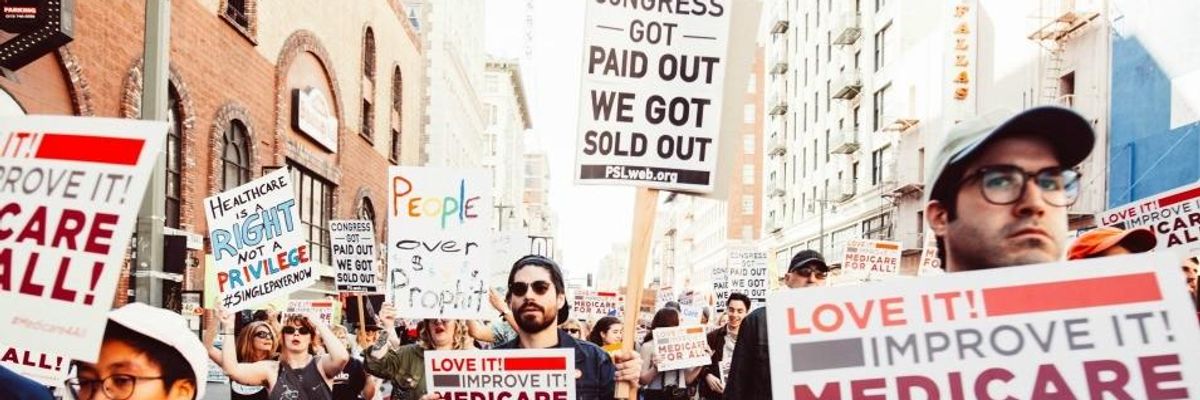Well, now I've heard everything:
Donald Trump wants to keep "the government" away from Medicare and protect seniors from attempts to improve it.
Huh?
Mr. President, take it from me--a newly-minted senior citizen and a doctor--you need to sit down and read the bill that single-payer supporters consider the gold standard for universal coverage:
H.R. 676, the Expanded and Improved Medicare for All Act. Don't worry, it's a much easier read than the average commercial health insurance policy.
Here's the deal: H.R. 676 would vastly upgrade Medicare for seniors by covering all medically necessary care, including dental, vision, hearing, mental health, and long-term care--none of which are currently covered. We learned very early on in medical school that, yes, the eyes, ears, mouth, and brain are all part of the human body and all those parts need care.
"The argument that expanding Medicare's coverage to younger Americans will somehow hurt seniors is preposterous."
H.R. 676 would also provide tremendous financial relief for seniors by eliminating Part B and D premiums and doing away with all copays and deductibles. Doctors know copays and deductibles only discourage patients from seeking care, and nobody should have to choose between buying groceries and paying for doctor visits.
Today, Medicare beneficiaries' average out-of-pocket health care spending was
41 percent of average Social Security income and
36 percent of those in traditional Medicare spent at least 20 percent of their income on out-of-pocket health care costs in 2013. H.R. 676 would provide the financial freedom that many seniors (and everyone else for that matter) need and deserve.
The seniors I talk to aren't fooled by restrictive
Medicare Advantage plans, either. They just want one, simple plan that gives them full choice of hospitals and doctors. Commercially administered Medicare Advantage plans don't offer a full range of choices. Why? Because it would cut into their obscene, taxpayer-funded profits.
The argument that expanding Medicare's coverage to younger Americans will somehow hurt seniors is preposterous. Mr. Trump, I know that you're old enough to remember when Medicare was first signed into law in 1964. When 19 million seniors enrolled in Medicare in the first year, there was no significant increase in the total number of doctor visits in the U.S., no evidence of reduced clinical capacity, no waiting lists, and no "rationing" of care.
The same happy story repeated itself when we provided coverage to millions of children through the Children's Health Insurance Program (CHIP) and low-income adults through Medicaid.
Our public health programs--especially Medicare--are an American success story, and an ideal foundation for a system that ensures high-quality care for everyone. The reason for that success is Medicare's remarkable administrative efficiency: Traditional Medicare's overhead is just over
3 percent, compared to private plans, including Medicare Advantage plans, whose overhead averages
30 percent.
Can the U.S. afford to expand Medicare to all? The real question is,
can we afford not to? Moving to a streamlined, national single-payer program like H.R. 676 would save an
estimated $617 billion annually by slashing the administrative waste of private health insurance and the paperwork imposed on hospitals and doctors ($504 billion), and by bargaining down drug prices ($113 billion). That would free up enough money for universal coverage without any net increase in U.S. health spending.
You try to frighten us with a $32 trillion price tag but fail to mention that if we maintain the status quo, we are on target to spend $50 trillion on health care over the next 10 years.
This desperate fear-mongering about Medicare for all is no surprise, given the surge in support for the idea, which is now favored by a majority of
Americans (including a majority of Republicans!) and a majority of doctors like me.
If you love Medicare, fight to make it better and expand it to every one of your constituents.

